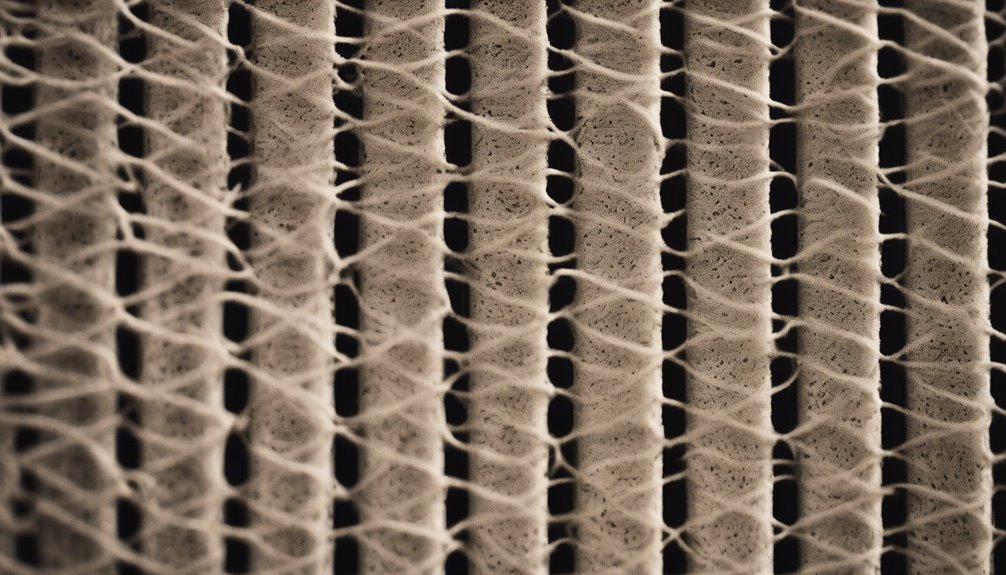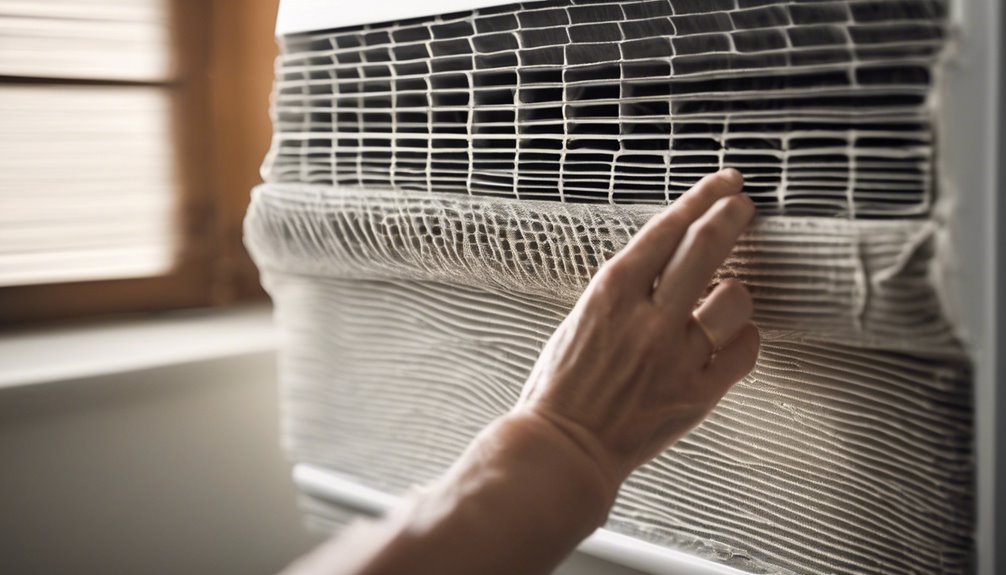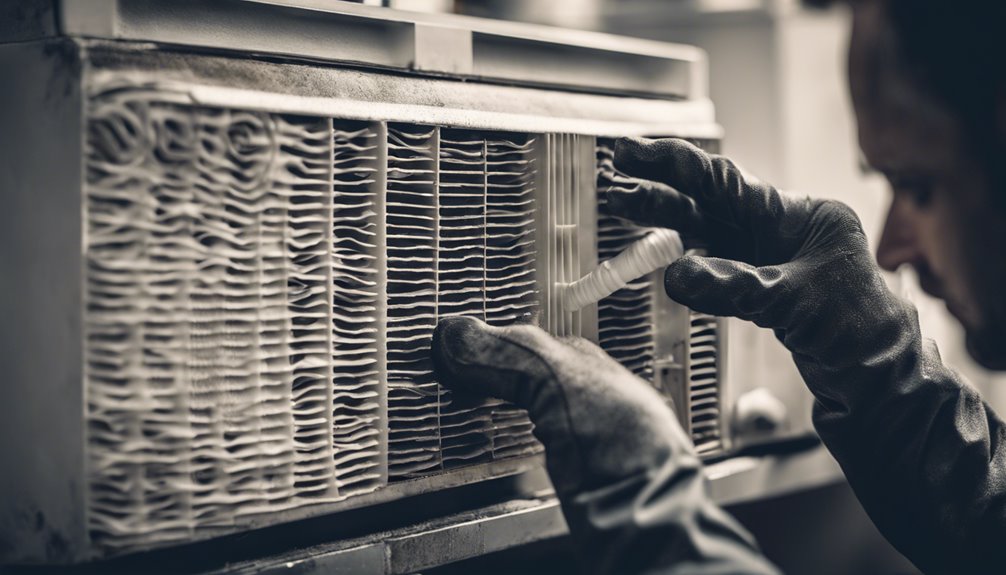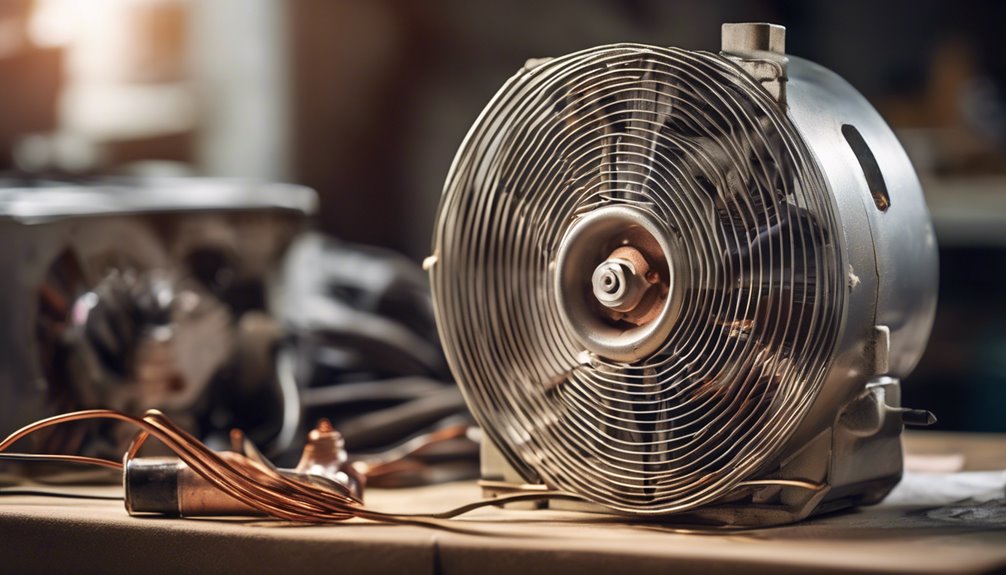If your air conditioner is working harder than usual, producing weak airflow, and causing your energy bills to skyrocket, it may be a sign that your AC filter is dirty and in dire need of replacement. You might notice allergy symptoms worsening, musty odors filling the air, and dust accumulation on the filter mesh. Inconsistent cooling patterns, temperature fluctuations, and unusual noises or vibrations from the unit can also indicate a dirty filter. If you're experiencing these issues, it's likely your AC filter is to blame – and it's just the tip of the iceberg.
Key Takeaways
- A dirty AC filter reduces airflow, causing some rooms to feel warmer than others and making it hard to cool the space.
- Inconsistent cooling patterns, temperature fluctuations, and constant AC running are indicators of a dirty filter restricting airflow.
- Dirty filters lead to increased energy bills, energy waste, and premature wear on AC components, resulting in higher maintenance costs.
- Poor air quality, allergy and asthma symptoms, and respiratory issues can escalate due to a dirty filter's inability to remove pollutants and allergens.
- Visible signs of a dirty filter include musty odors, dust particles circulating in the air, and dust accumulation on the filter mesh.
Reduced Airflow and Weak Airflow
When your air conditioner is running, you expect a refreshing breeze to circulate throughout your home.
However, if you notice reduced airflow or weak airflow, it may be a sign that your AC filter is dirty. A dirty filter restricts air pressure, making it harder for your AC to push air through the vents.
This can lead to ventilation issues, causing the air to stagnate and become stale. You might notice that some rooms feel warmer than others or that the air coming out of the vents is weak and barely perceptible.
If you're experiencing any of these symptoms, it's likely that your AC filter needs to be cleaned or replaced.
Increased Energy Bills and Higher Costs
You're probably no stranger to the frustration of seeing your energy bills skyrocket, but did you know that a dirty AC filter could be the culprit?
When your filter is clogged, your AC has to work harder, consuming more electricity and increasing your utility expenses.
As a result, you'll notice a significant hike in your energy costs, which can add up quickly over time.
Higher Electricity Consumption
A dirty air conditioner filter can cause your electricity consumption to skyrocket, leading to increased energy bills and higher costs.
You'll notice your energy waste adding up quickly, and it's essential to perform a cost analysis to understand the impact on your wallet.
- A dirty filter forces your AC to work harder, using more energy to cool your space.
- This increased energy consumption leads to higher costs, which can be a significant burden on your budget.
- By neglecting to clean or replace your filter, you're essentially throwing money away on unnecessary energy waste.
Increased Utility Expenses
Dirty filters not only increase energy consumption but also lead to higher utility expenses.
You'll notice a spike in your energy bills, and it's not just a coincidence. A dirty AC filter forces your air conditioner to work harder, resulting in energy waste.
This, in turn, leads to higher costs that can add up quickly. When you perform a cost analysis, you'll realize that a significant portion of your expenses is attributed to your AC's increased energy usage.
Replacing your filter regularly can help you avoid these unnecessary costs. By keeping your filter clean, you'll not only reduce energy waste but also lower your utility expenses.
Allergy and Asthma Symptoms Worsen
If you're prone to allergies or asthma, a dirty AC filter can make your symptoms worse.
You may notice your respiratory issues escalating, with congestion and coughing becoming more frequent.
As the filter continues to circulate dirty air, you'll likely find yourself struggling to breathe easily.
Respiratory Issues Escalate
Your airways are under attack when your AC filter is dirty, and you're the one suffering the consequences.
You may not even realize it, but poor air quality is taking a toll on your respiratory system.
Breathing difficulties become more frequent, and you might start to notice:
- Wheezing or coughing when you're not sick
- Shortness of breath even when you're sitting still
- Tightness in your chest that makes it hard to inhale deeply
These symptoms can be especially concerning if you have pre-existing respiratory conditions like asthma.
Congestion and Coughing
How often do you wake up with a stuffy nose, only to realize it's not just a cold, but your AC filter's dirty secret?
A dirty air conditioner filter can wreak havoc on your respiratory health, exacerbating congestion and coughing.
As air quality deteriorates, you may find yourself coughing more frequently, and your sinuses becoming increasingly congested.
If you have allergies or asthma, a dirty filter can make your symptoms worse, triggering attacks and making it harder to breathe.
By neglecting to clean or replace your AC filter, you're putting your health at risk.
It's time to take action and prioritize your air quality to prevent further respiratory issues.
Musty Odors and Unpleasant Smells
A dirty AC filter can make your air conditioner produce musty odors and unpleasant smells that permeate your entire home.
You might notice that your home doesn't smell as fresh as it used to, and that's because a dirty filter is circulating foul aromas throughout your living space. This can be especially problematic for people with respiratory issues or sensitivities.
Some common signs of musty odors and unpleasant smells due to a dirty AC filter include:
- A strong, pungent smell when you turn on your AC
- A lingering odor that doesn't seem to go away
- A general feeling of staleness in the air, rather than air freshness
Dust and Dirt Accumulation
You'll notice visible dust particles circulating in the air when you turn on your AC, which is a clear sign of a dirty filter.
Upon closer inspection, you'll likely find the filter mesh is clogged with dirt and debris, restricting airflow.
As a result, the airflow rate is significantly reduced, making your AC work harder to cool your space.
Visible Dust Particles
Visible dust particles are a clear indication of a dirty AC filter.
When you notice dust particles floating in the air or settling on surfaces, it's a sign that your filter is no longer doing its job. This is particularly concerning because it can negatively impact your air quality.
- You may start to experience respiratory issues or allergic reactions due to the increased dust accumulation.
- Your air conditioner will have to work harder to circulate air, leading to increased energy bills.
- The dust accumulation can also spread to other parts of your system, causing further damage.
Clogged Filter Mesh
Dust and dirt accumulation on the filter mesh is a telltale sign of a dirty AC filter. When you notice a thick layer of debris on the mesh material, it's time to take action. Neglecting filter maintenance can lead to more severe issues down the line.
| Mesh Condition | Accumulation Level | Action Required |
|---|---|---|
| Light dusting | Low | Clean or replace the filter |
| Thick layer | Medium | Inspect and clean the surrounding area |
| Clogged mesh | High | Replace the filter immediately |
Reduced Airflow Rate
A dirty AC filter can significantly reduce airflow rate, making your air conditioner work harder to circulate air throughout your home.
When dust and dirt accumulate on the filter, they create an airflow obstruction, restricting the amount of air that can pass through. This leads to ventilation issues, making your living space feel stuffy and uncomfortable.
Some common signs of reduced airflow rate include:
- Weak airflow from vents
- Increased energy bills due to your AC working overtime
- Musty odors circulating through your home
AC Unit Freezes or Ices Up
When your air conditioner's filter is clogged, the evaporator coils can't breathe, causing them to freeze up.
This ice buildup is a direct result of restricted airflow, which prevents the coils from dissipating heat properly. As a consequence, the frozen coil will reduce your AC's ability to cool your home, leading to increased energy bills and discomfort.
You might notice water leaking from the unit or ice forming on the exterior, which can cause further damage if left unchecked. It's essential to address the issue promptly to prevent more severe problems.
System Breakdowns and Repairs
Your air conditioner's dirty filter can cause more than just frozen coils – it can also lead to system breakdowns and costly repairs.
A dirty filter puts extra strain on your AC's components, causing them to work harder and wear out faster. This can lead to a breakdown, leaving you without cool air on a hot summer day.
A dirty filter increases strain on AC components, leading to premature wear and potential breakdowns on sweltering summer days.
- Increased system maintenance costs due to premature wear and tear
- The need for filter replacement, which can be a costly and time-consuming process
- Potential for complete system failure, requiring expensive repairs or even replacement
Inconsistent Cooling and Temperature Fluctuations
How efficiently does your air conditioner cool your home when its filter is clogged with dirt and debris?
You might notice inconsistent cooling patterns, where some areas of your home are cooler than others. This is because a dirty filter restricts airflow, causing temperature gradients to form.
You might feel like your AC is working harder to cool certain rooms, while others remain warm. As a result, you'll experience temperature fluctuations, making your home uncomfortable.
You might even notice that your AC is constantly running, trying to compensate for the restricted airflow. This not only wastes energy but also increases your utility bills.
Visible Mold and Mildew Growth
A dirty AC filter creates an ideal breeding ground for mold and mildew growth.
You might notice black spots or patches on the filter or surrounding areas, which can spread quickly if not addressed. This growth can significantly impact your air quality, making it unhealthy to breathe.
- You may experience respiratory issues, such as coughing or sneezing, due to mold spores in the air.
- Mold remediation can be a costly and time-consuming process, especially if left unchecked.
- Failing to address mold growth can lead to long-term health problems and even damage to your AC unit or surrounding structures.
Unusual Noises and Vibrations
What's behind the strange sounds coming from your AC unit?
If you're hearing rattling sounds or noticing vibrating motors, it might be a sign that your air conditioner's filter is dirty. A clogged filter can cause your AC to work harder, leading to unusual noises and vibrations.
Rattling sounds or vibrating motors might signal a dirty air conditioner filter, causing your AC to work harder and make unusual noises.
You might hear clunking, banging, or whirring sounds coming from the unit, which can be alarming. Don't ignore these signs, as they can indicate a more serious problem.
A dirty filter can lead to increased energy bills, reduced airflow, and even system failure. By replacing the filter, you can eliminate these strange noises and vibrations, ensuring your AC runs smoothly and efficiently.
Frequently Asked Questions
How Often Should I Clean or Replace My AC Filter?
You should clean or replace your AC filter every 1-3 months, depending on usage and pets. Regular filter maintenance is key, so inspect it monthly and clean or swap it out as needed to ensure efficient airflow and a healthy home.
Can a Dirty AC Filter Cause a Fire or Electrical Issues?
You're right to wonder: can a dirty AC filter spark a fire or electrical issues? Yes, it can! A dirty filter can overheat, causing fire hazards, and even lead to electrical surges that can damage your system or worse, ignite a blaze.
Will a Dirty AC Filter Affect My AC's Lifespan?
You're wondering if a dirty AC filter will shorten your air conditioner's lifespan. The answer is yes, it will. A dirty filter reduces air quality and filter efficiency, causing your AC to work harder, which can lead to premature wear and tear.
Can I Clean My AC Filter With a Vacuum or Water?
When you wonder if you can clean your AC filter with a vacuum or water, remember to handle it gently. For effective filter maintenance, you'll want to inspect the filter carefully, then opt for a gentle vacuum or a soft brush to remove dirt, not water, to avoid damage.
Do All AC Filters Need to Be Replaced or Can Some Be Cleaned?
You'll find that not all AC filters need replacement; some can be cleaned, depending on filter types and materials. For instance, reusable filters made of metal or foam can be washed, while disposable fiberglass filters should be replaced.
Conclusion
You've probably noticed that your AC isn't performing like it used to. The filter's likely to blame. A dirty AC filter can cause a multitude of issues, from reduced airflow to system breakdowns. Don't ignore the signs – replace that filter! Your wallet, allergies, and overall comfort will thank you. A clean filter ensures efficient cooling, fresher air, and a healthier home. So, take a few minutes to swap it out and breathe easy once again.



